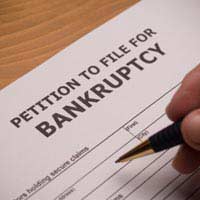Making Your Debtor Bankrupt

Making your debtor bankrupt should not be seen as a form of debt recovery, as there is no guarantee that you will get your money back. Bankruptcy fees are expensive and the process can be time consuming, so you should think very carefully before embarking on this procedure.
Debtor Unable to Pay Their Debts
In order to make your debtor bankrupt, the court will have to be satisfied that they are unable to pay their debts. There are several ways to prove this:- a debtor has not paid the debt after you issue them with a statutory demand; the statutory demand is for an amount that is in excess of £750; the debtor has not paid the debt; and has not applied for the statutory demand to be set aside.
- A creditor has obtained a county court judgment against a debtor and the judgment has not been paid.
Presenting the Petition
There are only certain county courts in England and Wales that have the power – or jurisdiction – to hear bankruptcy petitions. In London, you have to present the petition in the High Court. You will normally petition for your debtor’s bankruptcy in the court that is closest to the debtor’s home, or the place where they have lived the most (or traded the most, in the case of a business) in the last six months.As the petitioner you must complete the bankruptcy petition. These are available from the Insolvency Service website. You would use Form 6.7 if you have previously issued a statutory demand, or Form 6.9 if you have an unsatisfied county court judgment. It is very important that the information you provide on the petition is accurate, as you need to verify it with a ‘statement of truth.’ Providing false information is a criminal offence. You then file the petition at court, and three copies will be made. These copies are to be used as follows:
- serve one on the debtor
- attach another to your statement of truth which verifies the circumstances that have led to the petition
- if the debtor is subject to an IVA, you will also need to serve a copy on the supervisor of the IVA.
You will have to pay a deposit and a court fee when you present the petition (approximately £790 plus solicitor’s fees, if you use one.)
The court will then set a date for when the petition will be heard. This is normally at least fourteen days after the debtor is served with the petition. Usually, the petition has to be served on the debtor personally. The debtor may then decide to oppose the petition. If they intend to do this, they have to serve their own document (verified with a statement of truth) at least five working days prior to the hearing date.
What Happens at the Hearing
At the hearing the debtor, you as the petitioner, any other creditors, and the supervisor of the IVA (if there is one) are all entitled to attend the bankruptcy hearing and have their case heard. The court can do one of four things:- make a bankruptcy order
- stay the proceedings (delay or stop them)
- postpone the hearing to another date or
- dismiss the petition.
Business energy with a difference
Looking for better business energy options? Whether it’s advanced monitoring, new connections, or adjusting capacity, our sponsor, Purely Energy can help.
📞 Call 0161 521 3400 or simply send us your details below for a no-obligation chat.
Sponsored by Purely Energy
Purely kindly sponsors this site. They help businesses deal with all aspects from securing the lowest prices, capacity upgrades, usage monitoring using their proprietory software, Purely Insights, and many other aspects. Need help with your commercial energy? Enter your details below and they’ll get back to you.
- Making Your Debtor Bankrupt
- How to Issue a Statutory Demand
- How to Apply for an Attachment of Earnings Order
- Get a Court Judgment Taken Off the CCJ Register
- How to Apply for a Third Party Debt Order
- How to Apply for a Charging Order on a Debtor's Property
- Using a Bailiff
- How to Obtain Information About Your Debtor
- What to do About a County Court Judgment
- The Register of County Court Judgments Explained
- Paying a Judgment Debt by Instalments
- Summary Judgment in a Small Claims Case
- Unreasonable Court Costs Orders
- Who Pays Court Costs and Fees?
- Applying to Set Aside a Judgment Made at a Hearing
- The County Court Judgment and How it is Enforced
- Applying to Set Aside a Default Judgment

